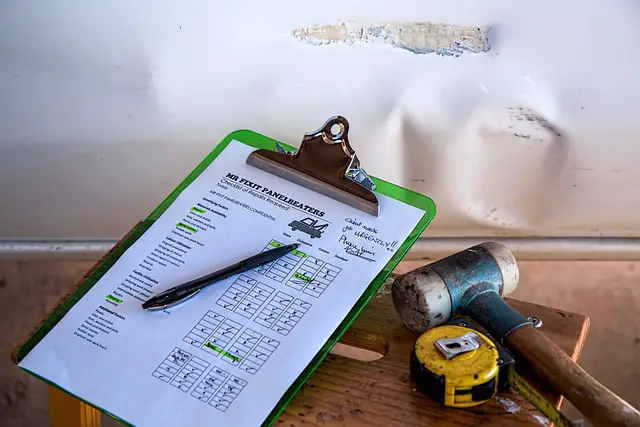Certainly! In summary, a quantity surveyor is responsible for assessing and managing costs related to construction projects, including estimating materials, labor, and expenses, as well as contract administration. On the other hand, an estimator focuses primarily on calculating and providing accurate cost estimates for construction projects based on various factors such as materials, labor, equipment, and overhead expenses.
Quantity surveyors

(Photo by Scott Blake on Unsplash )
Quantity surveyors play an integral role in the construction industry. They are responsible for managing costs and ensuring that projects stay within budget. Their duties range from preparing cost estimates to monitoring spending throughout the building process.
One of their primary responsibilities is estimating project costs, which involves analyzing plans and specifications to determine what materials, labor, equipment, and other expenses will be required. Quantity surveyors also ensure that all necessary permits and licenses are obtained before work begins.
Once construction begins, quantity surveyors monitor progress to make sure everything is on track financially. They may make adjustments as needed to keep the project within budget while still meeting quality standards.
In addition to cost management, quantity surveyors often provide advice on legal matters related to contracts or disputes between parties involved in a construction project. They may also help with insurance claims if any damage occurs during construction.
Quantity surveying requires strong analytical skills and attention to detail. It can be a challenging but rewarding career path for those interested in the intersection of business and construction.
Estimators

(Image by Steve Buissinne from Pixabay)
Estimators play a crucial role in the construction industry. They are responsible for evaluating and estimating the cost of projects, materials, and labor required to complete a project. These professionals work closely with architects, contractors, and other stakeholders to ensure that a project is completed within budget and on time.
An estimator uses their knowledge of engineering principles, design specifications, and blueprints to calculate the costs associated with building structures or completing infrastructure projects. Estimators must have excellent mathematical skills as they need to make accurate calculations based on complex data.
In addition to mathematical skills, estimators must also be great communicators. They need to be able to interact effectively with clients during meetings or presentations where they explain their findings in layman’s terms.
Due to the high demand for qualified estimators in the construction industry today, many educational institutions offer degree programs specifically designed for aspiring estimators. These programs cover topics such as cost estimating methods and techniques as well as software tools used in estimating practices.
Becoming an estimator takes hard work but can lead to a rewarding career path full of opportunities for growth within one’s field of expertise.
Quantity surveyor Vs. Estimator – Key differences
Quantity surveyors and estimators are two professions that often get confused with each other. While both of them deal with construction projects, they have different roles and responsibilities.
The key difference between a quantity surveyor and an estimator lies in their scope of work. Quantity surveyors focus on the financial management of a construction project, from start to finish. They assess costs, prepare estimates and budgets, monitor expenses, negotiate contracts, and ensure that the project stays within budget constraints.
On the other hand, estimators primarily focus on estimating the costs associated with building materials, labor expenses, equipment rentals or purchases among others required for construction projects before any work starts. Estimators must be detail-oriented as they need to provide accurate cost estimates while taking into consideration various factors such as location-specific material prices or labor rates.
Another fundamental difference is in regards to their timeline involvement throughout a given project time-frame; Quantity Surveyors are typically involved throughout every stage of a job whereas Estimators may only come on board during pre-construction planning stages.
Therefore it’s important for clients looking at completing successful building projects to understand these distinctions so that they can appreciate what type(s) of professionals will support them best based upon their specific goals moving forward!
How to become a quantity surveyor?
Are you interested in becoming a quantity surveyor? If so, there are several steps you can take to pursue this career path.
Obtaining a degree related to construction or engineering is highly recommended. This will provide you with the foundational knowledge needed for the profession. Some universities offer specific programs for aspiring quantity surveyors as well.
Next, gaining practical experience through internships or entry-level positions is essential in order to learn on-the-job skills and build industry connections. Networking is key in this field!
Additionally, pursuing professional qualifications such as those offered by the Royal Institute of Chartered Surveyors (RICS) can enhance your credibility and marketability within the industry.
It’s important to stay up-to-date with industry trends and advancements through continuing education courses and attending relevant conferences or seminars.
Becoming a successful quantity surveyor requires dedication and hard work, but with perseverance and passion for the field, it’s definitely achievable!
How to become a estimator?
If you are interested in pursuing a career as an estimator, there are several paths that you can take to achieve your goal. The first step is to obtain a high school diploma or equivalent. From there, you can either enter the workforce and gain experience on the job or pursue additional education.
One option for further education is to obtain an associate’s degree in construction technology or a related field. This type of program typically takes two years to complete and provides hands-on training in estimating techniques and software.
Another option is to earn a bachelor’s degree in construction management or engineering. This type of program takes four years to complete and provides more advanced coursework in estimating, project management, and other key areas.
Once you have obtained the necessary education and/or experience, it may be helpful to become certified by a professional organization such as the American Society of Professional Estimators (ASPE). Certification demonstrates your expertise in the field and can help set you apart from other job candidates.
Becoming an estimator requires dedication, hard work, and ongoing learning throughout your career. Whether entering through education or experience-based opportunities – success comes with perseverance!
What is a valuation surveyor?
A valuation surveyor is a professional who provides property valuations for various purposes, including sales and purchases, taxation, insurance, and investment. They use their expertise to determine the value of properties based on factors such as location, size, condition, and market trends.
Valuation surveyors typically work for real estate companies or financial institutions that require accurate property valuations. Their role is crucial in ensuring fairness and accuracy in transactions involving properties.
To become a valuation surveyor, one must have excellent analytical skills and knowledge of the real estate industry. A degree in a relevant field such as engineering or construction can be beneficial but not always required. One can also opt to pursue professional courses offered by accredited institutions.
Valuation surveyors play an integral role in the real estate industry by providing accurate property valuations for different purposes. It requires technical skills coupled with vast experience to excel at this profession.
What are the types of estimating?
When it comes to estimating, there are a variety of methods that can be used depending on the project and its specific needs. One type of estimating is conceptual estimating, which involves creating rough estimates based on limited information at the beginning stages of a project. This form of estimation is useful for determining feasibility and initial budgeting.
Another type of estimating is detailed estimating, which takes place after the design or plans have been finalized. This method involves breaking down each element within the project into smaller parts in order to create an accurate estimate.
There is also parametric estimating, where data from past projects with similar characteristics are analyzed in order to develop a model for future estimates. This form of estimation requires historical data to provide relevant insights.
In addition, there’s comparative or competitive bidding where suppliers provide pricing quotes for materials and services needed for your project. Proposals should include details such as scope work, payment terms and deadlines ensuring cost-effective results.
Bottom-up estimating involves adding up all expenses associated with individual tasks involved in a given project allowing greater accuracy by accounting for specifics affecting cost variables
While these are just some types available out there it’s important to choose what works best according to each unique situation providing accurate results suitable enough when making critical business decisions aligned with both time & budget constraints
Featured Image by – Scott Blake on Unsplash









